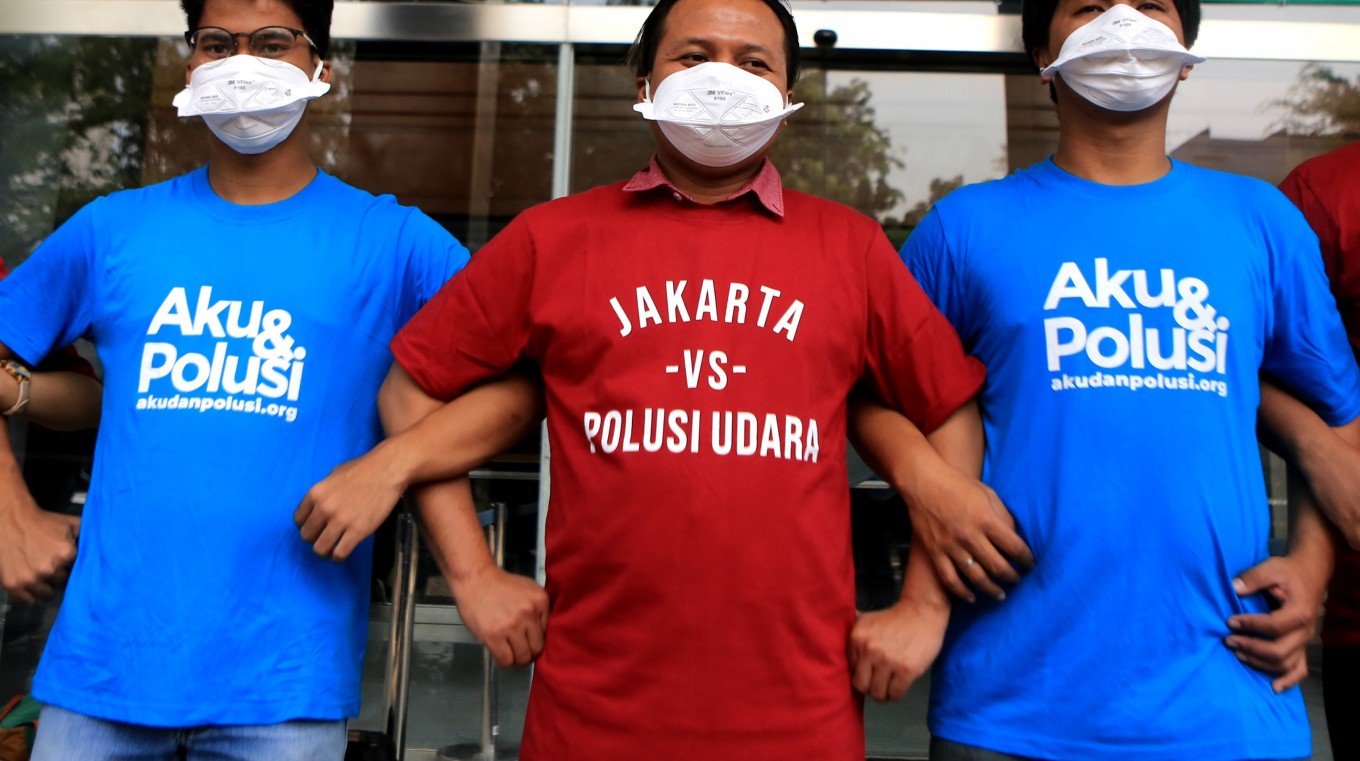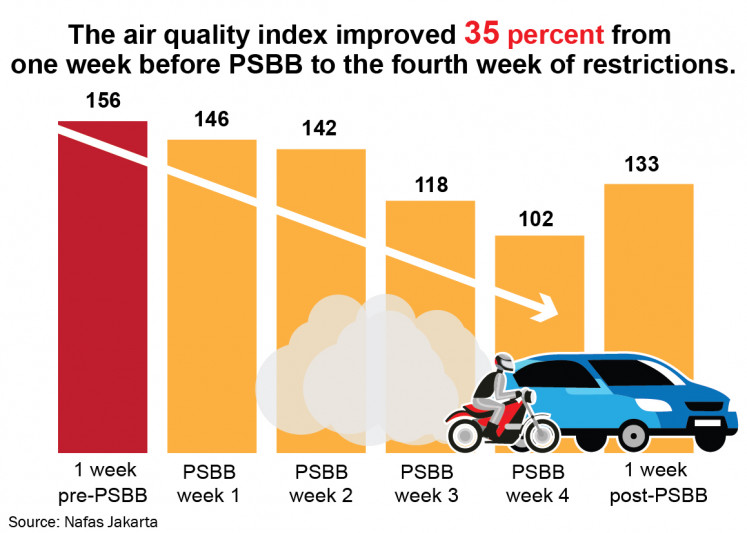Popular Reads
Top Results
Can't find what you're looking for?
View all search resultsPopular Reads
Top Results
Can't find what you're looking for?
View all search results[INSIGHT] Greater Jakarta’s air quality improves during PSBB
Home to 32 million people, most of whom commute to the capital city, Greater Jakarta is no stranger to unbearable traffic.
Change text size
Gift Premium Articles
to Anyone
H
ome to 32 million people, most of whom commute to the capital city, Greater Jakarta is no stranger to unbearable traffic. Add to it the high demand for electricity, industrial growth and lack of enforcement against burning trash, the air quality in the metropolitan area has been worsening steadily, year after year.
The Air Quality Life Index (AQLI) estimates that the average resident will lose 4.9 years of life expectancy as a result of air pollution. Globally, 8 million people die each year from air pollution-related diseases. This means that air pollution claims more lives than the combined fatalities from COVID-19, tuberculosis, malaria and car accidents.
What is even more devastating is that many of the preexisting health conditions that increase the risk of COVID-19 death are the same diseases that are caused by long-term exposure to air pollution. A Harvard University study has found that an increase of just 1 microgram per cubic meter (µg/m3) in particulate matter (PM) 2.5 is associated with an 8 percent increase in deaths from COVID-19.
To put this into perspective, the average air quality in June (71 µg/m3) for Greater Jakarta is 4.9 times more likely to increase the local COVID-19 death rate than in a city that meets the World Health Organization’s (WHO’s) air quality standard of 10 µg /m3.
That said, there was good news on air quality during the four-week phase two of the large-scale social restrictions (PSBB) in Jakarta, which ran from Sept. 14 to Oct. 11.
First, the average air quality during the PSBB months were unhealthy for sensitive groups with an Air Quality Index (AQI) ranging from 101-150, and unhealthy (AQI 151-200) during the transitional PSBB. The latest PSBB resulted in a lower AQI compared to the previous months, though not as low as in May, when the PSBB was imposed across Greater Jakarta. The second PSBB was implemented only in the capital and was relatively more lax in comparison, but nevertheless still made a noticeable impact on Greater Jakarta’s air quality.
Second, the air quality got better as the PSBB continued. The week before the PSBB was imposed recorded an average AQI of 156 (unhealthy). By the fourth week of the PSBB, the average AQI was 102 (unhealthy for sensitive groups). Week after week under the PSBB, the city saw a consistent downward trend in its AQI, indicating that the quality of its air was improving.
A good news comes from the second phase of the large-scale social restrictions (PSBB) in Jakarta, which runs from Sept. 14 to Oct. 11. (JP/-)The change was even more dramatic in weeks 3 and 4, which respectively recorded reductions of 24 percent and 35 percent in AQI, compared to 6 percent and 9 percent in weeks 1 and 2. Unfortunately, the second PSBB ended after four weeks, and the AQI again increased in the following week, though not immediately back to unhealthy levels (also thanks to the rain!).
Third, 37 of our 48 Nafas Jakarta sensors showed that Jakarta’s air quality met the WHO’s PM2.5 standard on at least one day. While this might sound horrific, that only one day on average met the WHO standard, it was actually (relatively) good news compared to the previous months. On Oct. 5, our sensors all recorded an average AQI of 78, or 25 µg/m3 of PM2.5, exactly the cutoff point to meet the WHO’s 24-hour standard for mean PM2.5 concentration.
Fourth, during the PSBB, the PM2.5 levels dropped 45 percent from pre-PSBB levels, which is the equivalent of cutting down smoking by 40 cigarettes per month.
Before the PSBB was imposed, the daily air pollution level in Greater Jakarta were equivalent to smoking almost three cigarettes. In the fourth week of the PSBB, the city’s pollution level had decreased to nearly half. If the week-4 pollution level were maintained for an entire month, the pollution in Greater Jakarta would be the same as cutting smoking by 40 cigarettes for a month. That’s two packs of cigarettes!
To put into perspective, air pollution in the United States is equivalent to 0.4 cigarettes per day, or 12 cigarettes per month. While Jakarta is still far from reaching this figure, the significant reduction during the PSBB surely gives us some hope.
Fourth, exercising during the PSBB was more beneficial than before the PSBB. A study by the Centre for Diet and Activity Research (CEDAR) suggests that exercising during high air pollution levels could do more harm than good.
If the PM2.5 level is 100µg/m3 (AQI 175) for the air outside, then exercising for 30 minutes has no health benefits. Exercising in air with a PM2.5 level of 165µg/m3 (AQI 217) will cause harm after just 30 minutes.
In August, 16 percent of total hours from all our sensors recorded PM2.5 levels exceeding 100µg/m3 (AQI 174, unhealthy), while 2.1 percent of total hours exceeded 165µg/m3 (AQI 215, very unhealthy). In contrast, during the four weeks of the PSBB, only 3.5 percent of total hours exceeded 100µg/m3 and only 0.3 percent of total hours exceeded 165µg/m3. These show reductions of respectively 4.6 times and 7 times from the previous month.
All this means that your outdoor activities were much more beneficial to your health during the PSBB than when the restrictions were not in place.
The author is the head of business and partnerships at Nafas Jakarta. The original article was published in medium.com.











